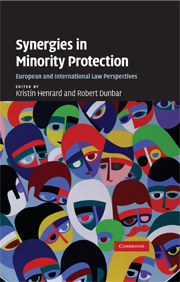Book contents
- Frontmatter
- Contents
- Foreword
- Abbreviations
- 1 Introduction
- PART A Minorities-specific instruments, provisions and institutions
- PART B Non-minorities-specific instruments, provisions and institutions
- 7 Developments relating to minorities in the law on genocide
- 8 The United Nations International Covenant on Economic, Social and Cultural Rights
- 9 The United Nations International Convention on the Elimination of All Forms of Racial Discrimination
- 10 The United Nations Convention on the Rights of the Child and Children Belonging to Minority Groups
- 11 UNESCO's Convention Against Discrimination in Education
- 12 A patchwork of ‘successful’ and ‘missed’ synergies in the jurisprudence of the ECHR
- 13 The many faces of minority policy in the European Union
- 14 Developments under the African Charter on Human and Peoples' Rights relevant to Minorities
- 15 Regional cooperation and minority issues in the Asia-Pacific region
- Index
- References
14 - Developments under the African Charter on Human and Peoples' Rights relevant to Minorities
from PART B - Non-minorities-specific instruments, provisions and institutions
Published online by Cambridge University Press: 21 July 2009
- Frontmatter
- Contents
- Foreword
- Abbreviations
- 1 Introduction
- PART A Minorities-specific instruments, provisions and institutions
- PART B Non-minorities-specific instruments, provisions and institutions
- 7 Developments relating to minorities in the law on genocide
- 8 The United Nations International Covenant on Economic, Social and Cultural Rights
- 9 The United Nations International Convention on the Elimination of All Forms of Racial Discrimination
- 10 The United Nations Convention on the Rights of the Child and Children Belonging to Minority Groups
- 11 UNESCO's Convention Against Discrimination in Education
- 12 A patchwork of ‘successful’ and ‘missed’ synergies in the jurisprudence of the ECHR
- 13 The many faces of minority policy in the European Union
- 14 Developments under the African Charter on Human and Peoples' Rights relevant to Minorities
- 15 Regional cooperation and minority issues in the Asia-Pacific region
- Index
- References
Summary
Introduction
The issue of minorities in Africa remains controversial and problematic. The notion of who constitutes a minority in countries that were arbitrarily constructed as a result of the colonial imperatives of former European empires remains contested. This historical context does not negate the existing challenge of ensuring minority protection on the continent. This chapter will briefly discuss the signing of the African Charter on Human and Peoples' Rights. It will outline some of the provisions contained in the Charter, particularly with reference to peoples. Even though the African Charter is non-minority-specific in the sense that it refers to ‘peoples’, this chapter will argue that there are provisions within the Charter that are relevant to minorities. It will then assess the creation of the African Commission on Human and Peoples' Rights, as a supervisory mechanism to implement and monitor the legal provisions of the Charter and its practice. The chapter will evaluate the recent developments in the practice of the African Commission by examining the case of the Ogoni people in Nigeria and the Katanga region of former Zaire (present day Democratic Republic of the Congo). An assessment of the potential synergy between the African Charter and other international minority protection instruments will be discussed throughout the chapter. The creation of the African Court as an institution that will complement the supervisory role of the Commission with a protective mandate will be highlighted.
- Type
- Chapter
- Information
- Synergies in Minority ProtectionEuropean and International Law Perspectives, pp. 385 - 400Publisher: Cambridge University PressPrint publication year: 2009
References
- 1
- Cited by



